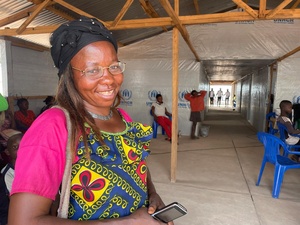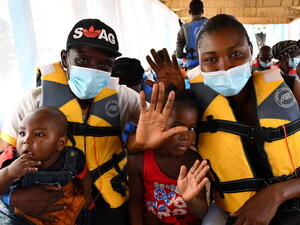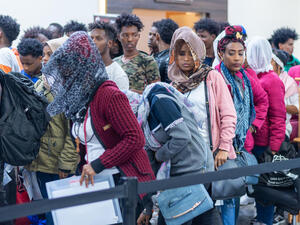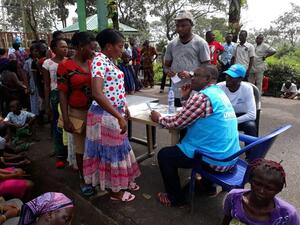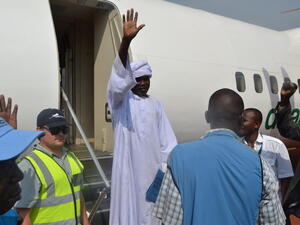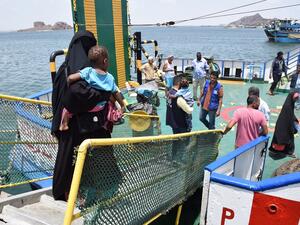Sudanese return from Congo after long years in exile
Sudanese return from Congo after long years in exile

The first Sudanese refugees to return home from the Democratic Republic of the Congo get a warm welcome from one of their compatriots. A batch of 224 refugees were repatriated to southern Sudan by UNHCR convoy.
KINSHASA, Democratic Republic of the Congo, June 8 (UNHCR) - The first Sudanese refugees to go home from the Democratic Republic of the Congo (DRC) crossed the border into their homeland this week. The UNHCR-organized convoy of trucks carried 224 people and their possessions across the border at Morebo on Wednesday.
They are some of the more than 2,600 Sudanese sheltering in DRC who have told the UN refugee agency they would like to return home this year. Altogether, some 13,500 Sudanese refugees remain scattered around north-eastern DRC after fleeing Sudan's civil war around 1990. Many thousands have already gone home without UNHCR help.
"Repatriation day is always a day of joy," said UNHCR representative Eusebe Hounsokou as the convoy left. "Refugees should be commended for their patience, since they waited for years for this event to occur.
"Their joy is our joy as well, and I am glad we have been able to make it happen despite a harsh funding situation," Hounsokou said, referring to dramatic shortfalls in donations towards UNHCR's programmes. The refugee agency's 2005/2006 revised appeal for the repatriation and reintegration of Congolese refugees has received only 14 per cent of the necessary funding, with only $10.6 million received out of $75 million required.
The return of these Sudanese was made possible by the signing in Kinshasa on January 30 of two separate tripartite agreements between DRC, Sudan and UNHCR. The agreements paved the way for Congolese to come home from Sudan as well as for Sudanese to go home from DRC. Over the years, refugees had fled in both directions, seeking safety from instability in their own countries.
The first Congolese came home from around Juba in southern Sudan in early May, and a flight earlier this week brought the total number repatriated so far to 341, out of a total of 1,500 Congolese registered for return.
Wednesday's convoy took overjoyed Sudanese families - mainly from Biringi and Ayamba - to Yei in south Sudan, a distance of 125 km. They were waved off on the Congolese side by other Sudanese refugees who sang and danced at the prospect of going home themselves. "Now we are sure we will return home," said one refugee who plans to go later.
On the way back home, the returnees stayed in a transit centre erected by UNHCR, where they completed customs and immigration formalities and had two hot meals before the last leg of their journey.
After signing of the tripartite agreements made the prospect of return more real, UNHCR organized a visit in March that allowed refugees to test the waters in southern Sudan for themselves. They came back to DRC to tell other refugees about whether the time was right to go home.
They reported on conditions after the 21-year-long war destroyed roads, schools, boreholes and homes, as well as killing hundreds of thousands of people and displacing millions. UNHCR has worked in south Sudan to clear roads of mines and rehabilitate schools, boreholes and hospitals for the returnees.
UNHCR's Hounsokou said the repatriations in south Sudan this week marked "the start of another journey for the returnees - this is Day One for rebuilding new lives in a new Sudan. Good luck to all of you."
The returnees receive material for constructing homes, agricultural tools and domestic items such as blankets, sleeping mats and kitchen utensils. Inside Sudan, the UN World Food Programme provides three months' worth of food to help tide returnees over until they can support themselves.
Among the estimated 13,500 Sudanese scattered around Ariwara, Biringi, Ayamba and Aru are cattle herders, commercial tobacco growers and pastoralists.
UNHCR staff in Aru said some refugees have not yet registered for return because they are waiting to harvest and sell crops, or because their children are still in school. Many refugees said they were encouraged by this first convoy and would likely register to go home with UNHCR's help.
"The Sudanese have been very patient for the long time they have been waiting, and their desire to go back home visibly rose after the 'go-and-see' visit in March this year," said a UN staffer in Aru.
By David Nthengwe in Kinshasa, Democratic Republic of the Congo


